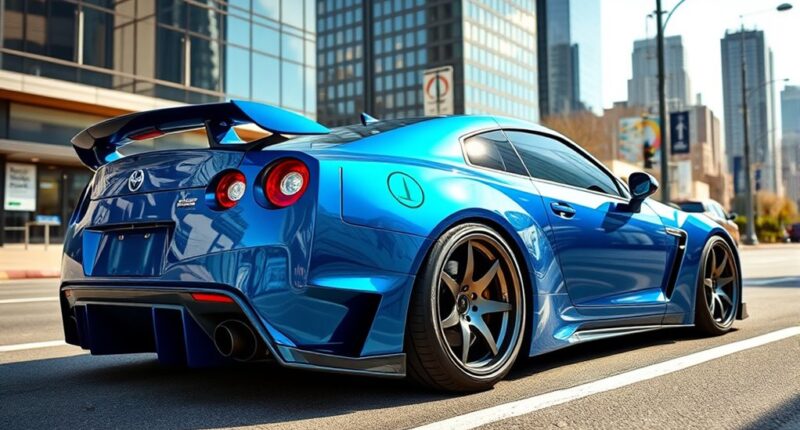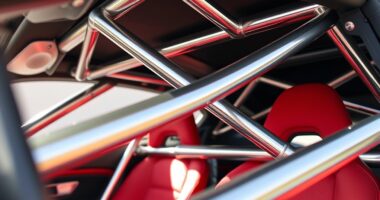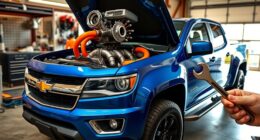When insuring a tuned car, you need to disclose all modifications to your insurer, as many standard policies exclude performance or aesthetic upgrades. It is crucial to get proper appraisals, keep receipts, and follow state laws on emissions and safety. Upgrades can increase premiums and theft risk, so consider specialized coverage options. Staying transparent and maintaining documentation helps prevent claim issues. To learn how to protect your customized ride properly, keep exploring these important insurance considerations.
Key Takeaways
- Fully disclose all modifications to insurers to ensure accurate coverage and prevent claim disputes.
- Obtain specialized policies or endorsements for performance upgrades and aftermarket parts.
- Keep detailed documentation, receipts, and certifications to verify modifications and compliance with laws.
- Be aware of potential premium increases due to visible or high-value upgrades and security features.
- Regularly review insurance policies to confirm coverage aligns with vehicle modifications and legal requirements.
Understanding Policy Adjustments for Modified Vehicles
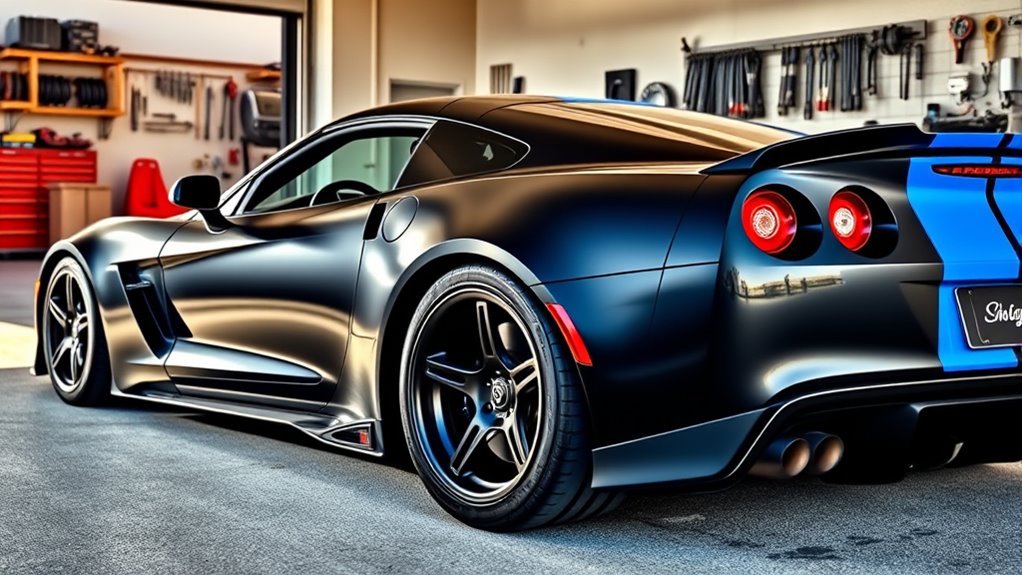
When you modify your vehicle, insurance companies often need to adjust your coverage to reflect these changes. Typically, you’ll need either endorsements added to your existing policy or a dedicated custom car insurance policy. This reassessment considers the new risks and the increased value of your vehicle, especially if you’ve added performance upgrades or aesthetic enhancements. The insurer might require an appraisal to accurately determine the worth of your modifications. Whether you installed upgrades yourself or had them professionally done can influence how your coverage is adjusted. Keep in mind that some modifications, like turbochargers or suspension upgrades, can considerably impact premiums. Providing thorough documentation of all customizations helps ensure your coverage is accurate, preventing issues during claims and ensuring you’re fully protected. Additionally, understanding the policy adjustments needed for modified vehicles can help prevent unexpected out-of-pocket expenses. Being aware of modification types and their impact on insurance costs can further aid in proper policy management. Recognizing the importance of transparency and responsibility when reporting modifications can also influence how insurers evaluate your risk profile. Staying informed about insurance policies and their specific requirements for tuned cars can help you navigate the claims process more smoothly.
Common Coverage Exclusions and How to Address Them
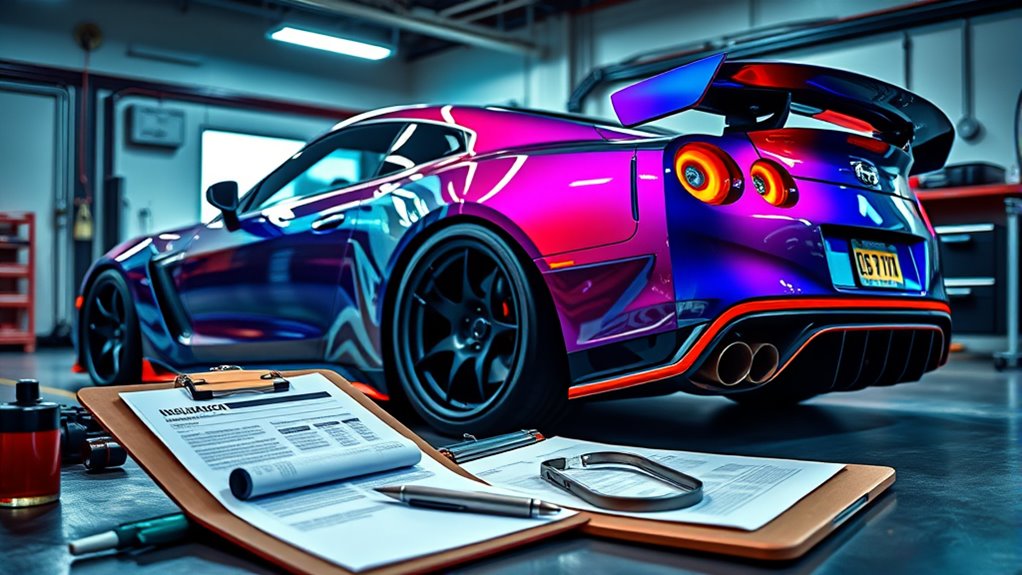
Understanding what your insurance policy excludes is crucial for properly protecting a modified vehicle. Standard policies often exclude structural or performance modifications, custom paint exceeding certain costs, and aftermarket parts unless specified. Wear and tear, mechanical breakdowns, and non-disclosed modifications can void coverage or lead to claim denial. To navigate these exclusions, you need to be proactive. Additionally, selecting the appropriate USB cable type can ensure reliable connections when diagnosing or modifying your vehicle’s electronic systems. Being aware of coverage limitations can help you better communicate with your insurer about your vehicle’s modifications and seek suitable add-ons or specialized policies. Familiarizing yourself with Glycolic Acid Benefits for Skin may also help in maintaining your skin’s health after long modification sessions. Recognizing insurance policy nuances can further prevent surprises during the claims process.
Evaluating the Impact of Performance and Aesthetic Upgrades
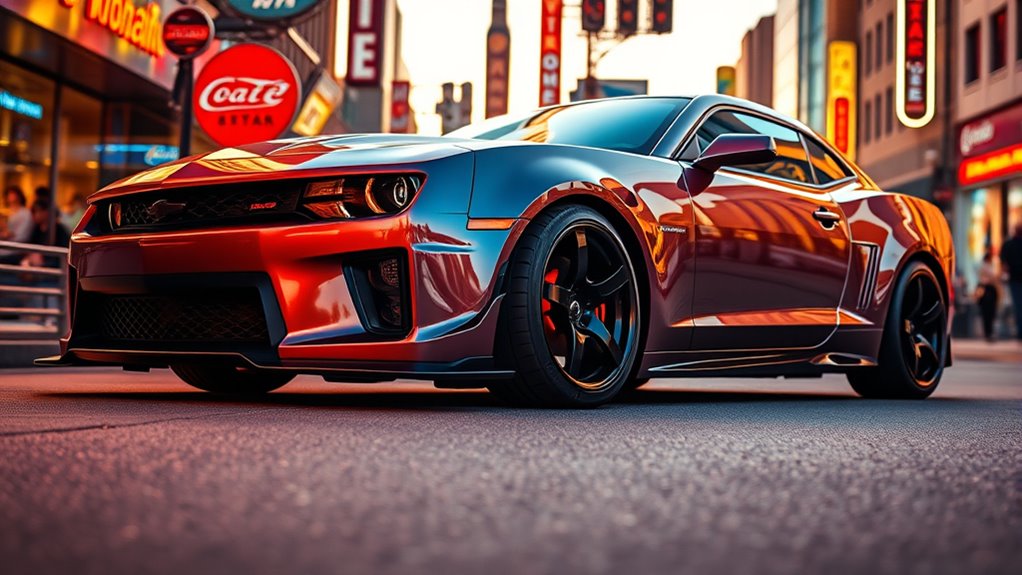
Evaluating the impact of performance and aesthetic upgrades is vital to guarantee your modified vehicle remains adequately protected by your insurance policy. Performance upgrades, like turbochargers or suspension changes, can increase risk and lead to higher premiums. They also raise repair costs if accidents happen, and you might need specialized policies. Be transparent about your modifications to avoid claim issues. Additionally, understanding insurance coverage hours and how they align with your modifications can help ensure you’re fully protected during all times. Incorporating aura insights, such as understanding potential risks or emotional impacts related to your vehicle, can enhance your overall safety and awareness. Recognizing how AI in cybersecurity enhances vehicle security measures can provide additional protection against theft or vandalism. Aesthetic upgrades, such as custom paint or decals, can boost your car’s value and potentially increase premiums. They may also require extra coverage endorsements. Visible modifications could raise theft risks, influencing costs further.
Exploring Insurance Coverage Options for Tuned Cars
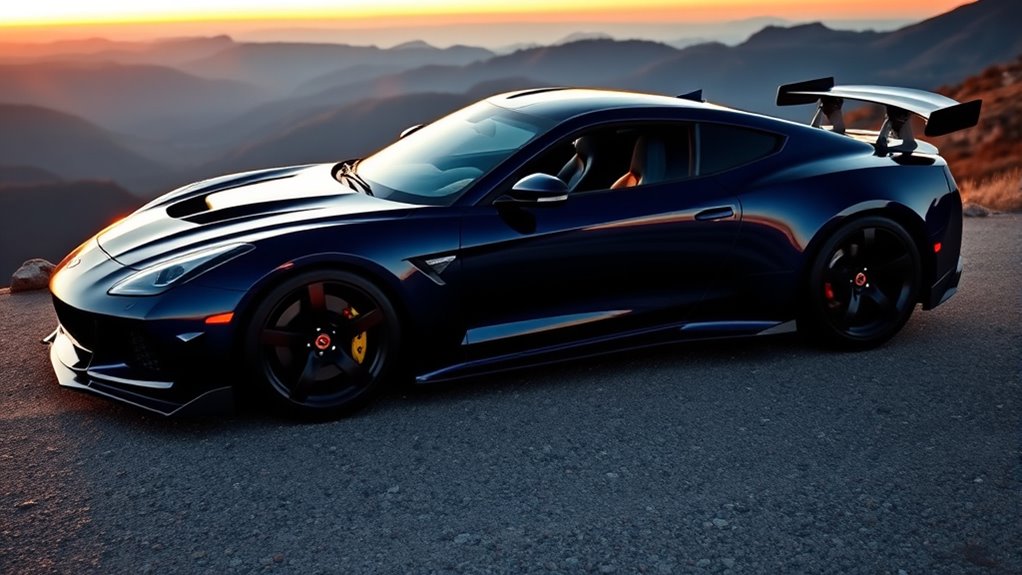
Finding the right insurance coverage for your tuned car requires exploring various options tailored to high-performance and customized vehicles. You’ll want to contemplate custom parts coverage, which protects aftermarket upgrades from damage or theft. Policy endorsements are also useful; they allow you to add specific coverage for your modifications to standard policies. Some owners prefer separate custom car insurance policies for comprehensive protection, especially if their modifications are extensive. Comparing different insurance providers is essential—look for those offering flexible plans that adapt to your car’s unique features and usage. Keep in mind that high-value or complex modifications can influence premiums and coverage options. Additionally, understanding how insurance companies evaluate risk and the specific vulnerabilities of your vehicle can help you better tailor your coverage to your tuned car’s needs. Moreover, understanding how Halloween celebrations vary around the world can help you appreciate diverse cultural perspectives, which may inform your approach to risk and coverage in different regions. It is also beneficial to consider performance modifications that may impact insurance premiums and coverage options, ensuring your policy adequately reflects your car’s capabilities. Ultimately, diligently researching and choosing an insurer that understands your tuned car’s needs ensures you’re protected, no matter what happens on the road.
Factors That Influence Premiums on Customized Vehicles
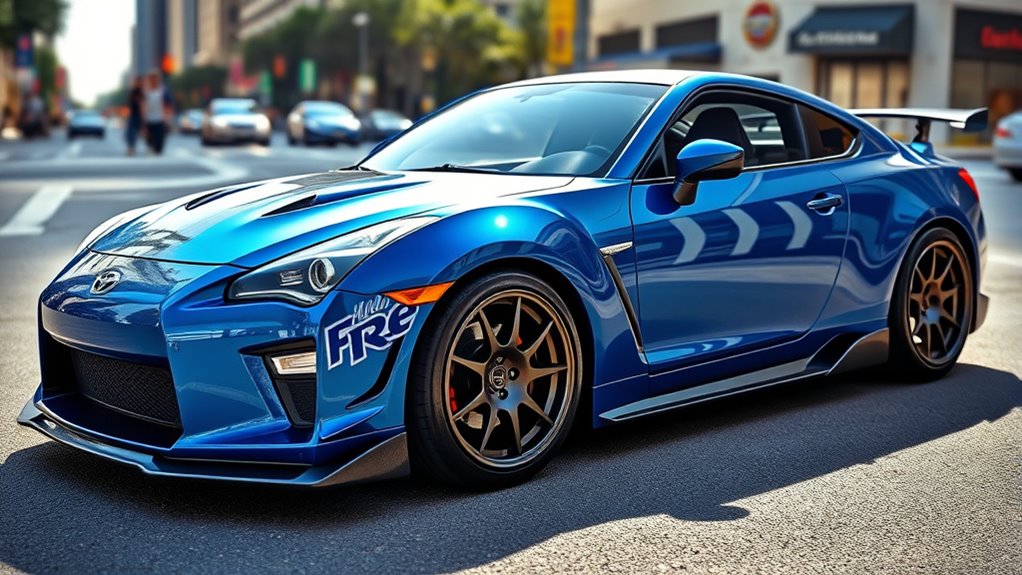
Your premiums on a customized vehicle are heavily influenced by several key factors, primarily the vehicle’s overall value and the extent of modifications. Modifications can increase your car’s worth, making repairs or replacements more expensive, which raises premiums. Insurers evaluate how modifications affect safety and performance, impacting costs. Cosmetic changes like rims or paint jobs usually have minimal effect unless they increase theft risk. Performance upgrades, such as supercharged engines or suspension tweaks, heighten safety concerns and accident risk, driving premiums higher. The vehicle’s use also matters; a daily driver versus a show car can influence costs. Ensure all modifications are disclosed to guarantee proper coverage, preventing gaps. Keep in mind:
- Vehicle’s increased value
- Performance and safety concerns
- Cosmetic modifications’ visibility
- Driver’s claim history
- Vehicle usage patterns
- Security features can also influence insurance premiums, especially if they enhance vehicle safety or theft prevention.
Risks Inherent to Modifications and How to Mitigate Them
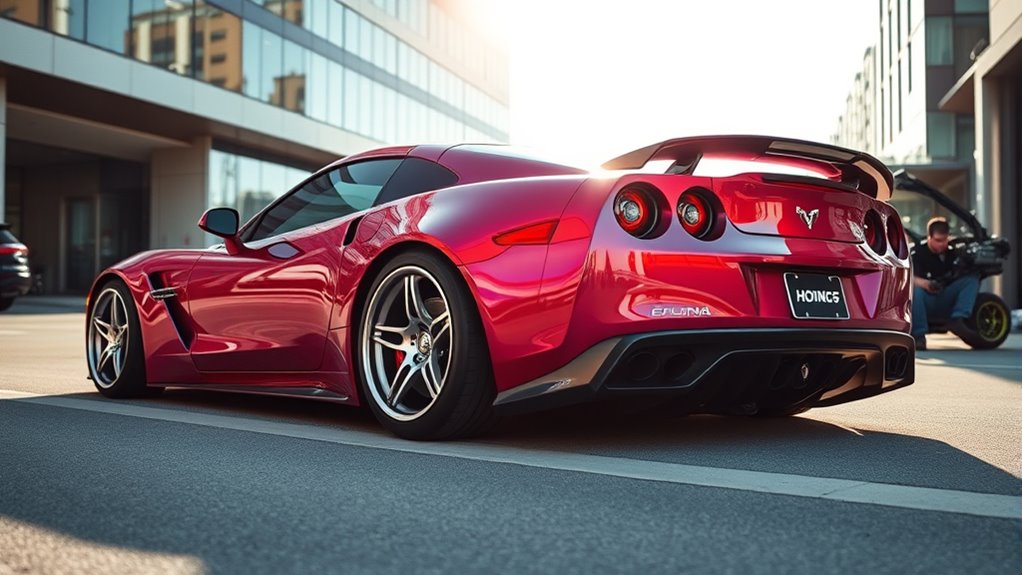
Modifications to a vehicle can introduce significant risks that impact safety, reliability, and insurance coverage. Performance upgrades like turbochargers or fuel system enhancements increase accident risk due to higher speeds and aggressive driving. They also lead to higher repair costs and can invalidate factory warranties. Cosmetic modifications such as custom paint or body kits complicate repairs and may reduce resale value, with insurance companies sometimes undervaluing these upgrades. Suspension and brake alterations can compromise handling, increase component wear, and reduce safety system effectiveness. Additionally, undisclosed modifications risk claim denials, policy cancellations, and legal penalties. To mitigate these risks, always get professional installation, consult your insurer beforehand, conduct regular safety inspections, and consider specialized insurance riders. These steps help protect you and your vehicle from unforeseen issues.
Essential Documentation for Insured Modified Cars
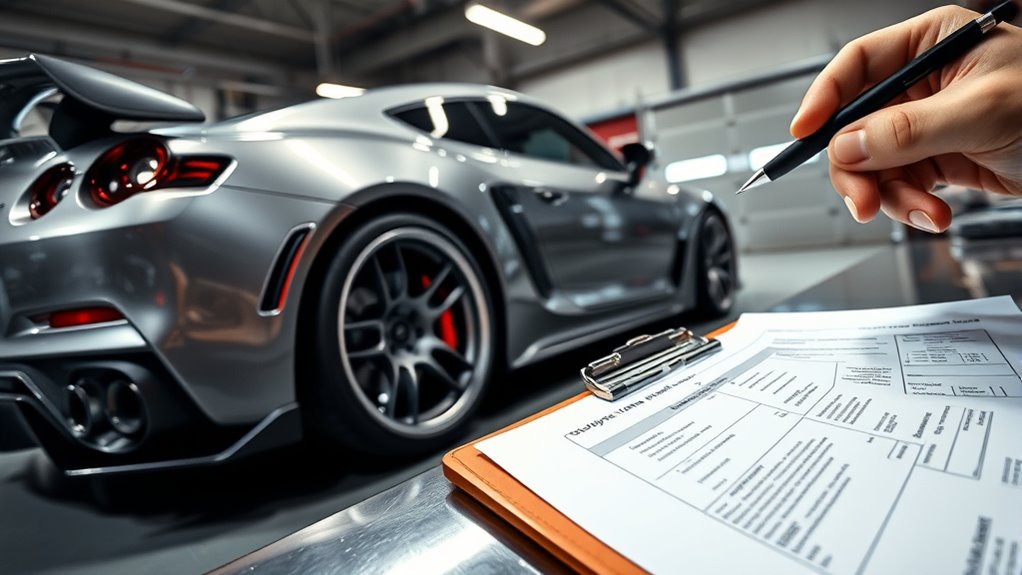
Having thorough documentation for your modified vehicle is essential to guarantee your insurance coverage remains valid and to support any claims you may need to make. Proper records prove your modifications meet safety and legal standards and clarify their scope to your insurer. Keep track of:
- Original purchase receipts for aftermarket parts
- Manufacturer specs and installation guides
- Garage invoices confirming professional installation
- Before-and-after photos of modifications
- Certifications ensuring compliance with safety and emissions laws
- Proper documentation supports analytical thinking and provides a comprehensive view of your vehicle’s modifications. Additionally, understanding the sound healing science behind certain modifications can help you explain their benefits and safety features to your insurer.
This documentation helps prevent disputes, accurately assesses your vehicle’s value, and ensures your policy covers your upgrades. Staying organized with these records simplifies communication with your insurer and provides solid proof of your modifications’ legitimacy and safety.
Strategies to Lower Insurance Costs for Tuned Vehicles
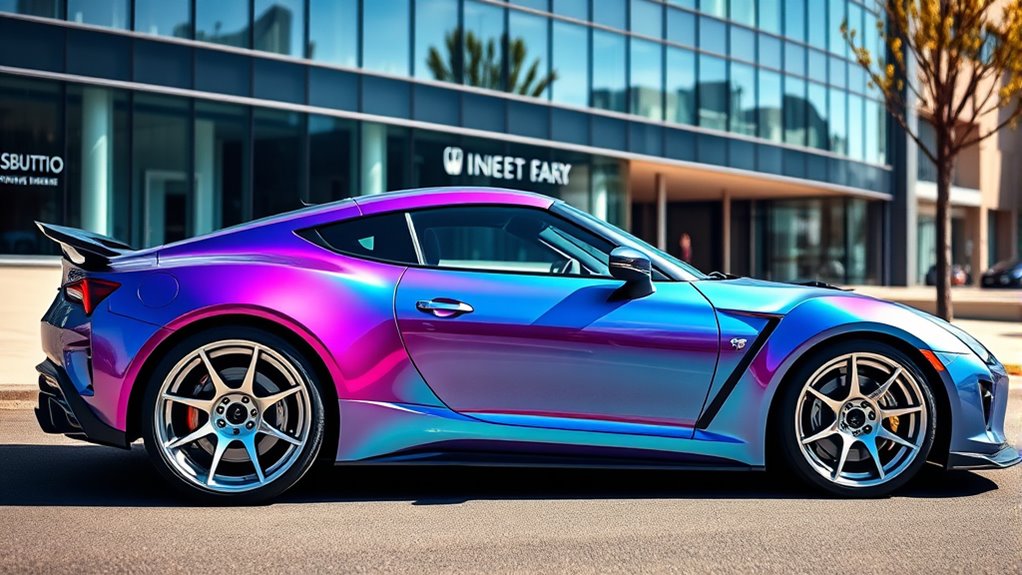
To reduce insurance costs for tuned vehicles, implementing strategic approaches can make a significant difference. First, compare quotes from multiple insurers, especially those specializing in modified cars—they often offer better rates. Consider custom policies designed for modifications, which can be more affordable than standard plans. Increasing your deductible lowers premiums but means paying more out-of-pocket if you’re claims. Keep your driving record clean; it can help offset higher costs associated with modifications. Additionally, add safety features like anti-theft systems, rearview cameras, or adaptive headlights—these can qualify you for discounts. Regularly inform your insurer about any changes or updates to your modifications, ensuring accurate risk assessment. Finally, bundling your modified vehicle insurance with other policies may *access* discounts and reduce overall expenses.
Ensuring Legal Compliance to Maintain Coverage
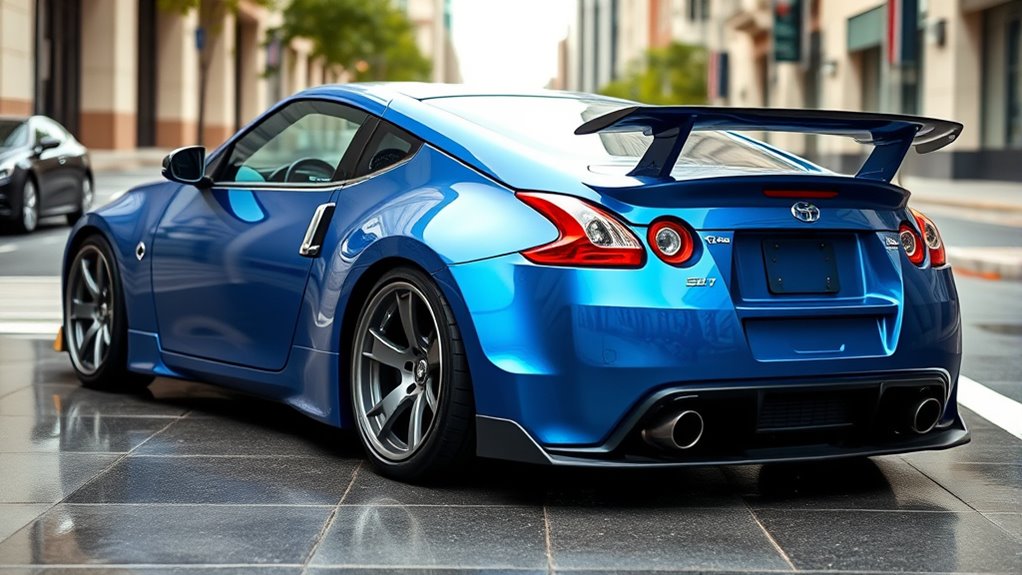
Ensuring your tuned vehicle remains insured requires strict adherence to legal requirements and proper disclosure practices. Failure to comply can result in policy voidance, liability issues, or legal penalties. To stay compliant, always disclose all modifications, including minor ones, and keep documentation like receipts and installation certificates. Be aware of state-specific laws on emissions, lighting, and structural changes, and avoid prohibited modifications such as illegal lift kits or excessive window tinting. Regularly verify that your vehicle meets safety and registration standards, and obtain necessary certifications if required. Additionally, consider these key points:
Keep your tuned vehicle insured by fully disclosing modifications and maintaining proper documentation to stay compliant with legal standards.
- Report all modifications to your insurer to avoid voidance
- Maintain proof of professional installation and documentation
- Respect height, lighting, and noise regulations
- Comply with emission and safety inspection laws
- Stay updated on local ordinances and registration requirements
Frequently Asked Questions
Can I Add Modifications After Purchasing My Insurance Policy?
Yes, you can add modifications after purchasing your insurance policy, but you need to notify your insurer immediately. Failing to do so risks claim denials or coverage gaps. Some insurers require endorsements or riders for aftermarket parts, while others may adjust your premium based on the new modifications. Always keep documentation, like receipts and installation records, to verify your modifications and guarantee your coverage remains valid.
How Do I Prove the Value of My Custom Parts to Insurers?
To prove the value of your custom parts, you should gather detailed receipts and professional appraisals that confirm their market worth. Take clear photos and videos of the modifications before and after installation, and keep records of dyno test results. Additionally, obtain third-party validation from industry experts. This documentation demonstrates the enhancement’s value, helping insurers accurately assess your vehicle’s worth and ensure proper coverage.
Are There Specific Insurers Known for Better Coverage of Tuned Cars?
Think of your tuned car as a rare gem needing a trusted jeweler. Some insurers, like Hagerty, are experts in handling custom and collector vehicles, offering tailored coverage that fits like a well-made suit. Allstate and Esurance also provide options for modified cars, while Progressive requires special endorsements. These companies understand that your vehicle’s unique character demands specialized attention, ensuring your prized ride stays protected through every twist and turn.
What Happens if I Don’T Disclose All Modifications During Policy Renewal?
If you don’t disclose all modifications during policy renewal, your insurance could become invalid. The insurer might void your policy, leaving you uninsured, or deny future claims. This also increases your risk of legal penalties if caught driving uninsured. Additionally, undisclosed modifications can lead to higher premiums or difficulty getting coverage later. Always be transparent with your insurer to protect yourself financially and legally, and to guarantee your coverage remains valid.
Do Modified Cars Have Different Insurance Requirements in Different States?
Imagine cruising through different states, your modified car turning heads. You might assume insurance rules stay the same, but they don’t. Some states require extra documentation or impose stricter safety checks, especially for emissions or safety-related mods. Others may see higher premiums due to theft rates or regulations. So, your insurance needs can vary, and it’s essential to understand each state’s specific requirements to stay protected and compliant.
Conclusion
When insuring your tuned car, understanding policy tweaks and coverage options is vital. Did you know that modified vehicles can cost up to 20% more in premiums? By staying compliant, documenting upgrades, and choosing the right coverage, you can reduce costs and avoid denied claims. Keep informed, manage risks wisely, and you’ll enjoy your customized ride with peace of mind, knowing you’re protected without breaking the bank.
